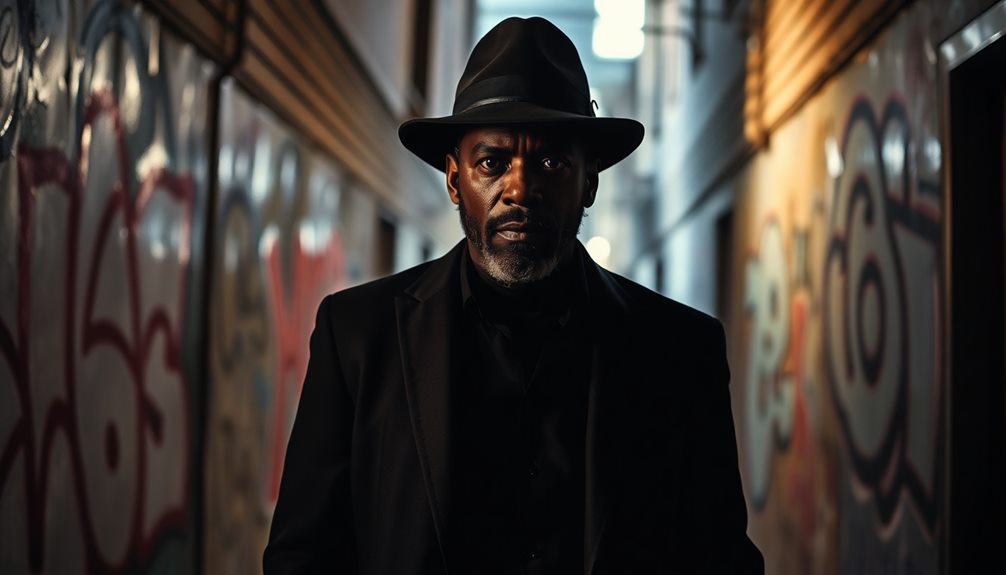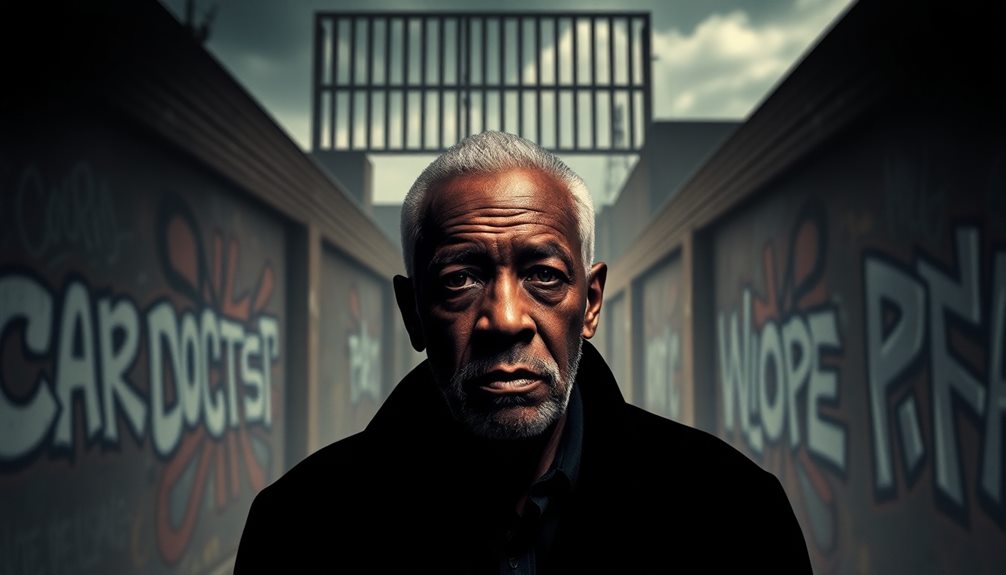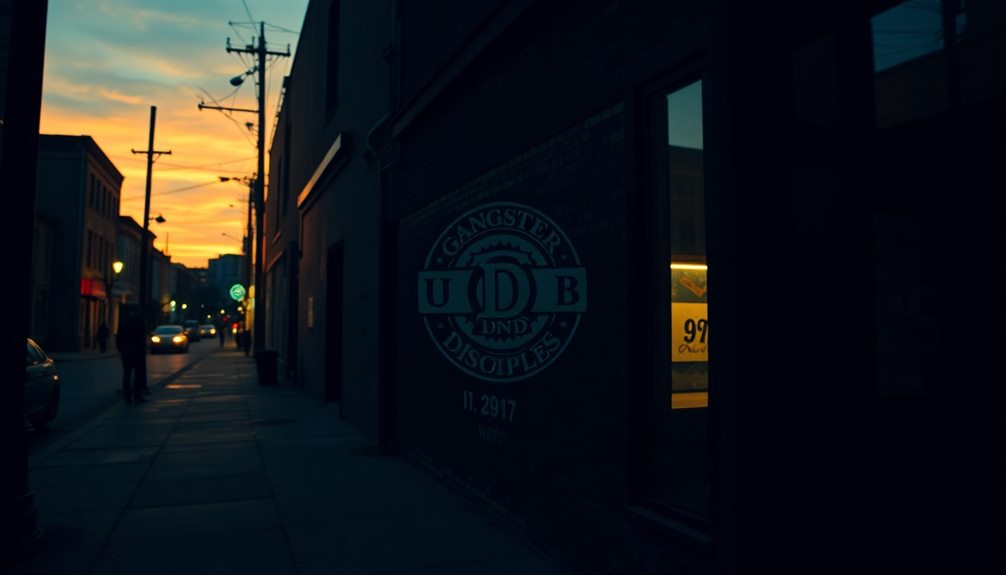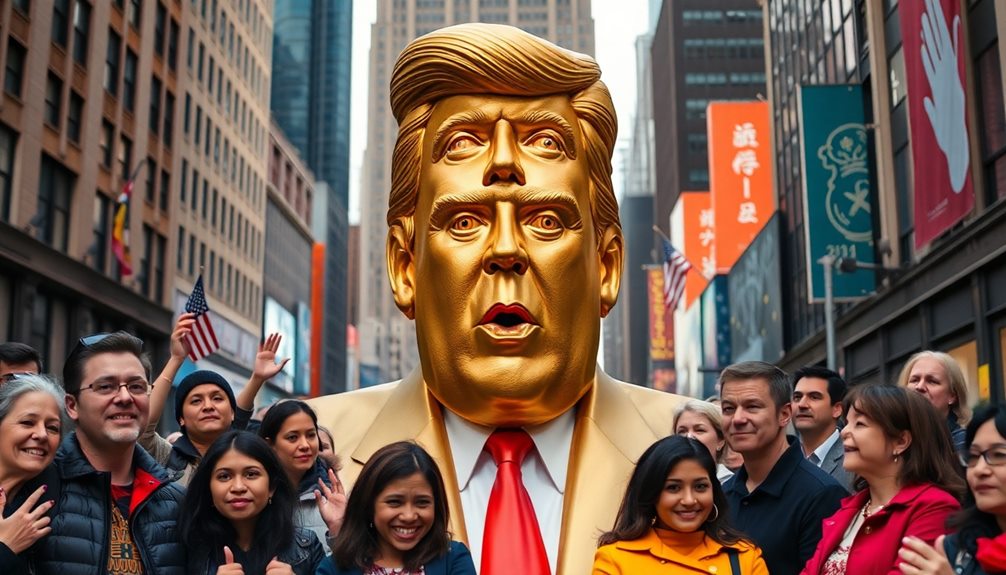Larry Hoover, born on November 30, 1950, in Jackson, Mississippi, has become a notorious figure in gang history. He joined the Supreme Gangsters at just 13 and co-founded the Black Gangster Disciple Nation in 1969. After David Barksdale's death, Hoover took control of the gang, expanding its reach and influence. He was arrested for murder in 1973 and has remained in prison ever since. While Hoover has attempted to advocate for community reform, his legacy is still hotly debated. To uncover more about his life, gang involvement, and efforts for change, one can explore the complexities surrounding his story.
Key Takeaways
- Larry Hoover was born on November 30, 1950, making him 72 years old as of 2023.
- He co-founded the Black Gangster Disciple Nation (BGDN) in 1969, significantly impacting Chicago's gang culture.
- Hoover was arrested and sentenced to life imprisonment for murder in 1973, with additional convictions in 1997.
- Despite being incarcerated, he maintained influence over gang operations and sought community reform initiatives.
- His legacy is debated, seen as both a notorious criminal and a potential advocate for community renewal.
Introduction

Larry Hoover, a prominent figure in Chicago's gang history, has been both a notorious criminal and a symbol of reform. Born on November 30, 1950, he became involved in gang culture at a young age, joining the Supreme Gangsters around 13.
In 1969, he co-founded the Black Gangster Disciple Nation (BGDN), which quickly evolved into a major criminal organization in Chicago. Hoover's influence extended beyond street-level operations; he became a central figure in the gang's activities, orchestrating drug conspiracies that ultimately led to his downfall.
In 1973, Hoover was sentenced to life imprisonment for his involvement in a murder. His legal troubles didn't stop there; in 1997, he received additional life sentences for drug conspiracy.
Despite being incarcerated, he managed to maintain significant influence over gang operations, showing the depth of his reach. Over the years, Hoover has attempted to reshape his public persona, claiming personal reform while still being recognized as one of the most notorious criminals in Chicago's history.
His life story intertwines crime and the quest for redemption, making him a complex figure in the narrative of urban gangs.
Background

Born in Jackson, Mississippi, and raised in Chicago, Hoover's early life played a crucial role in shaping his path toward gang involvement. At just 12 or 13, Larry Hoover joined the Supreme Gangsters, a street gang that introduced him to a world of petty thefts and escalating criminal activities.
By 1969, he co-founded the Black Gangster Disciple Nation (BGDN) alongside David Barksdale, quickly rising to prominence within the gang. Following Barksdale's death in 1974, Hoover assumed control and transformed the BGDN into a powerful entity within Chicago's drug trade.
During his peak operations, Hoover generated over $1,000 daily in profits, solidifying his status as a notorious gang leader. However, his criminal endeavors caught up with him; in 1973, he was arrested and convicted for murder, leading to a life sentence.
While incarcerated, Hoover faced additional convictions for racketeering and conspiracy, further solidifying his reputation. His life story reflects the complexities of gang culture in Chicago, illustrating how early influences and choices can lead to a life marked by violence and incarceration.
Gangster Disciples' Founding Year

In 1969, the Gangster Disciples emerged as a formidable force in Chicago's gang landscape, co-founded by Larry Hoover and David Barksdale. This merger of their respective gangs aimed to create a more powerful organization, initially known as the Supreme Gangsters.
Following the merger, the group rebranded itself as the Black Gangster Disciple Nation (BGDN), reflecting its expanded ambitions and influence.
Under Hoover's leadership, the Gangster Disciples quickly established a stronghold on the South Side of Chicago. They not only dominated local territories but also expanded their operations into drug trafficking and other criminal enterprises.
This strategic growth solidified their reputation as a notorious gang, known for its organized structure and hierarchical leadership.
The Gangster Disciples became synonymous with various criminal activities, engaging in everything from extortion to drug distribution.
Through their calculated operations, they transformed into one of the most influential street gangs in the United States. Hoover's vision and leadership were pivotal in shaping the gang's identity and operational reach, leaving a lasting impact on Chicago's gang landscape.
Community Divided Over Hoover's Legacy

Amidst the ongoing discussions about Larry Hoover, community perceptions remain sharply divided. While some view him as a notorious criminal associated with the violent legacy of the Gangster Disciples, others champion him as a figure advocating for positive reform and community development.
Supporters highlight Hoover's initiatives under the rebranded Growth and Development, which focused on education and gang violence prevention, aiming to foster a constructive impact in Chicago neighborhoods.
Conversely, critics argue that Hoover's legacy is tainted by the criminal activities linked to his gang, which have continued to plague communities long after his imprisonment. The debate over his influence is complex; some believe his incarceration has reduced gang violence, while others see it as a catalyst for ongoing struggles within the gang hierarchy.
The ongoing advocacy for Hoover's release, bolstered by high-profile supporters like Kanye West, underscores a faction of the community yearning for reconciliation and transformation.
This polarization reflects the intricate dynamics of how Hoover is perceived, revealing the challenges of reconciling his criminal past with the potential for reform and growth in Chicago's neighborhoods.
Prison Reform Advocacy Efforts

Larry Hoover's advocacy for prison reform has gained traction over the years, highlighting his shift from a life of crime to one focused on community renewal. Since renouncing his criminal past in 1993, Hoover has emphasized the importance of education and skill development, particularly among former Gangster Disciples members. His efforts aim to foster community development and promote rehabilitation.
In 2021, Hoover sought to appeal his six life sentences under the First Step Act, a legislative measure designed to reform the criminal justice system and reduce recidivism. However, his appeal was denied, as authorities viewed him as a continuing criminal threat.
Despite this setback, the Larry Hoover Project, initiated by his partner Winndye Jenkins-Hoover in 2014, advocates for clemency and raises awareness about the need for justice reform.
While Hoover remains incarcerated, he strives to distance himself from gang activities and instead seeks to serve as a positive influence. Supporters argue that his public statements and commitment to reform demonstrate a genuine desire for change, despite the complexities of his extensive criminal history and ongoing legal challenges.
Frequently Asked Questions
Who Started GD in New York?
The Gangster Disciples (GD) in New York City emerged in the late 1980s, primarily through individuals linked to the Chicago leadership.
These members migrated to New York, bringing with them the gang's established structure and ideology. They played a crucial role in setting up local chapters, which contributed to the gang's expansion and influence in the area.
Their arrival marked a significant shift in the city's gang culture, sparking rivalries and territorial disputes.










